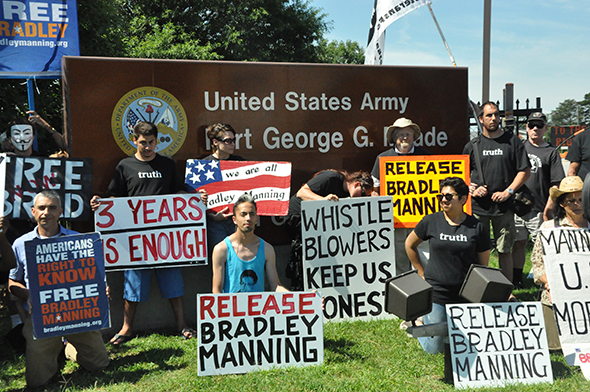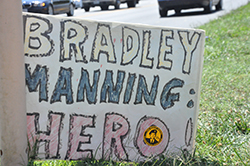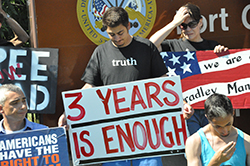
Members of the Bradley Manning Support Network protest outside the gates of Fort Meade, MD. (Kristin Callahan/MNS)
WASHINGTON – A military judge Tuesday acquitted Pfc. Bradley Manning of aiding the enemy – a charge that would have carried a maximum sentence of life in prison for the Army intelligence analyst.
This was the most serious charge Manning faced for leaking more than 700,000 classified military reports and diplomatic cables. But the judge, Col. Denise Lind, convicted Manning on most of the remaining charges, including theft, fraud and several counts of violating the Espionage Act, which could warrant a long prison sentence. The charges dealt with information revealing the ways the U.S. prosecuted its wars in Iraq and Afghanistan.
Manning himself did not testify. Although, he did request that a judge and not a jury decide his fate. It took Col. Lind three days to deliberate.
Hours before the verdict, more than two-dozen Manning supporters demonstrated outside the gates of Fort Meade, Md., wearing “truth” T-shirts and waving signs proclaiming their admiration for the soldier.
“What Bradley Manning was trying to do was prevent more people being killed in a costly war that was not being conducted responsibly, and that was unnecessary to begin with,” said Emma Cape, a member of the Bradley Manning Support Network, which advocates for the defendant.
Cape, 27, is from San Francisco, but has been living in Columbia, Md., so she could attend the trial. She said she has sat in the courtroom every day for the past two-months.
“I’ve yet to see any evidence of how the U.S. national security was actually damaged by what he did,” Cape said. “Authorities were speaking in extreme generalities – there have been no specifics given about anyone being injured by this information.”
Manning, now 25, pleaded guilty earlier this year to lesser offenses that could have landed him 20 years behind bars.
“I think this is a young man who’s representative of my generation in many ways,” Cape said, in the sense that Manning joined the military and went to serve in Iraq because he believed he would be “helping to spread democracy and save lives.”
“Just like hundreds of other young veterans I’ve talked to, he became very jaded by what he saw in Iraq and he felt American people needed more information,” Cape said.
Manning was deployed to Baghdad in 2009. He soon became alarmed by what he came to see as egregious U.S. wartime conduct and, as a result, became a mole for the anti-secrecy group WikiLeaks. He was first detained in Iraq for suspicion of having leaked the video of a 2007 Apache helicopter attack that killed several Iraqi civilians.
For Iraqi activist Farah Muhsin, it was a feeling of relief and validation when the classified documents became public.
“Bradley revealed a huge amount of important documents that revealed the truth about the wars in Iraq and Afghanistan,” Muhsin said. “And as an Iraqi, I feel particularly obliged to support him because the documents tell the reality of what happened in my country.”
Muhsin, 28, is originally from Baghdad, but has been a refugee in the U.S. since 2008.
“It is highly important to stand up for somebody who stood up for the whole world and told the truth,” Muhsin said.
But not everyone agrees, and according to Ricardo De Vecchi, rules are rules.
“If you are working for a government, you have to follow the rules of the government,” De Vecchi, 38, said in an interview in Washington. “He took the information and gave it to somebody else – he went against the rules of his country.”
WikiLeaks ultimately obtained more than 700,000 military and diplomatic documents from Manning. These included war logs from Iraq and Afghanistan, cables between the State Department and U.S. embassies and assessments of detainees held at Guantanamo Bay, Cuba. The release of the documents has been said to be the most extensive leak of classified material in U.S. history.
Manning’s sentencing hearing begins Wednesday. He could receive up to 136 years in prison.


